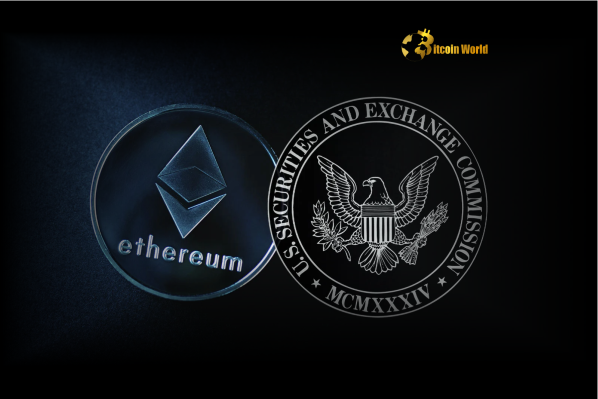BitcoinWorld

SEC Ethereum Stance Under Fire: Rep. Timmons Demands Crucial Transparency
The world of cryptocurrency is constantly buzzing with activity, but few topics generate as much debate and concern as regulation. At the heart of this debate often sits the U.S. Securities and Exchange Commission (SEC) and its approach to digital assets. Recently, the spotlight has been firmly placed on the SEC’s stance regarding Ethereum (ETH), the second-largest cryptocurrency by market cap.
Why is the SEC’s Ethereum Stance So Important?
For years, the regulatory status of Ethereum has been a subject of significant discussion. Is ETH a security, subject to strict SEC rules, or is it a commodity, regulated differently (or not at all, in some interpretations)? The answer has profound implications for how ETH can be traded, offered, and developed within the United States. Clarity from the SEC is something the crypto industry has desperately sought, yet it has remained elusive.
This lack of clear guidance creates significant uncertainty for businesses, developers, and investors operating in the Ethereum ecosystem. It affects everything from potential exchange listings to the development of decentralized applications (dApps) and the overall growth of the market.
Rep. William Timmons Steps Up on SEC Transparency
Enter U.S. Republican Representative William Timmons. Frustrated by the ongoing ambiguity, Rep. Timmons has taken a direct approach, formally calling on SEC Chair Gary Gensler to release documents that could shed light on the agency’s historical perspective on Ethereum. Specifically, Timmons wants to see records outlining the SEC’s internal discussions and decisions regarding ETH’s status, particularly those made during Gensler’s tenure.
In a letter addressed to Chair Gensler, Rep. Timmons didn’t mince words. He criticized the SEC’s regulatory approach to cryptocurrencies as inconsistent and lacking the clarity needed for market participants to comply effectively. This criticism isn’t new; many in the crypto industry and on Capitol Hill have voiced similar concerns about the SEC’s perceived “regulation by enforcement” strategy.
The Context: Gensler, Hearings, and Investigations
Rep. Timmons’ letter specifically references a notable moment during an April 2023 congressional hearing. During this hearing, Chair Gensler was repeatedly pressed to clarify the SEC’s position on Ethereum’s status. Despite the direct questions, Gensler reportedly refused to provide a definitive answer. This refusal became particularly noteworthy because, according to reports that emerged shortly after the hearing, the SEC had reportedly launched a formal investigation into Ethereum just days prior.
This sequence of events—a public refusal to clarify followed by reports of a private investigation—fueled accusations of a lack of transparency and a potentially contradictory approach within the SEC. Rep. Timmons argues that understanding the agency’s internal discussions and reasoning, especially from that period, is essential for Congress and the public to evaluate the SEC’s actions and the prior leadership’s approach to this crucial asset.
What Documents is Timmons Demanding?
While the specific list of requested documents wasn’t detailed in the initial report, Rep. Timmons is likely seeking internal SEC communications, memos, legal analyses, or other records that reveal the agency’s internal debates and conclusions regarding Ethereum’s classification. Releasing these documents, he contends, would provide valuable insight into:
- How the SEC applied the Howey Test (the legal framework used to determine if an asset is an investment contract, and thus a security) to Ethereum over time.
- Whether the agency’s view evolved, and if so, why.
- The basis for any decision to initiate an investigation into ETH.
- The level of internal consensus or disagreement within the SEC on the matter.
Access to this information could help clarify whether the SEC had a consistent, albeit unstated, policy on ETH, or if its views shifted, contributing to the current regulatory uncertainty.
Why Transparency Matters for Crypto Policy
Transparency from regulatory bodies is crucial for the healthy functioning of any market, perhaps even more so in a nascent and rapidly evolving space like cryptocurrency. Here’s why Rep. Timmons’ demand for SEC transparency is significant for broader crypto policy:
| Aspect | Why Transparency Helps |
|---|---|
| Market Certainty | Allows businesses and investors to understand the rules and make informed decisions, fostering growth rather than fear of unexpected enforcement actions. |
| Fairness | Ensures that regulatory actions are based on clear, understandable principles, not arbitrary or shifting interpretations. |
| Congressional Oversight | Enables elected officials to effectively oversee regulatory agencies and ensure they are acting within their mandate and serving the public interest. |
| Innovation | Reduces the risk for innovators developing on blockchain platforms like Ethereum, encouraging rather than stifling technological advancement in the US. |
The demand for transparency isn’t just about Ethereum; it’s about setting a precedent for how the SEC communicates its stance on digital assets moving forward and how future crypto policy is shaped in the United States.
Challenges and Potential Outcomes
Will the SEC comply with Rep. Timmons’ request? That remains to be seen. Regulatory agencies often resist releasing internal documents, citing reasons like protecting ongoing investigations or internal deliberative processes. However, pressure from Congress can be a powerful tool.
Potential outcomes of this demand include:
- Full or Partial Release: The SEC could release some or all of the requested documents, potentially with redactions. This would offer valuable insights but might still leave some questions unanswered.
- Refusal: The SEC could refuse the request, potentially leading to further congressional action or increased political pressure.
- Increased Dialogue: The demand might spur more direct communication between the SEC and Congress regarding crypto regulation, even if documents aren’t immediately released.
Regardless of the immediate outcome, Rep. Timmons’ action highlights the growing impatience in Congress with the SEC’s perceived lack of clarity on crypto assets and underscores the importance of the SEC Ethereum question for the broader regulatory landscape.
Actionable Insight for the Community
For anyone involved in the crypto space, this development is a reminder that regulatory risk is a significant factor. Staying informed about congressional actions like this, as well as the SEC’s public statements and enforcement actions, is crucial. While individual investors can’t directly influence the SEC’s decisions, understanding the potential regulatory environment helps in assessing the risks associated with holding or developing on platforms like Ethereum.
Concluding Thoughts
Rep. William Timmons’ demand for SEC transparency on Ethereum’s status is a significant moment in the ongoing debate over cryptocurrency regulation in the United States. It shines a direct light on the frustrations stemming from regulatory uncertainty and challenges the SEC to be more open about its processes and positions. The outcome of this request could provide crucial clarity, influence future crypto policy, and set a precedent for how regulatory agencies interact with the rapidly evolving world of digital assets. The call for transparency is loud and clear, and the crypto community, along with lawmakers, will be watching closely to see how the SEC responds.
To learn more about the latest Ethereum regulation and crypto policy trends, explore our articles on key developments shaping Ethereum price action and institutional adoption.
This post SEC Ethereum Stance Under Fire: Rep. Timmons Demands Crucial Transparency first appeared on BitcoinWorld and is written by Editorial Team




